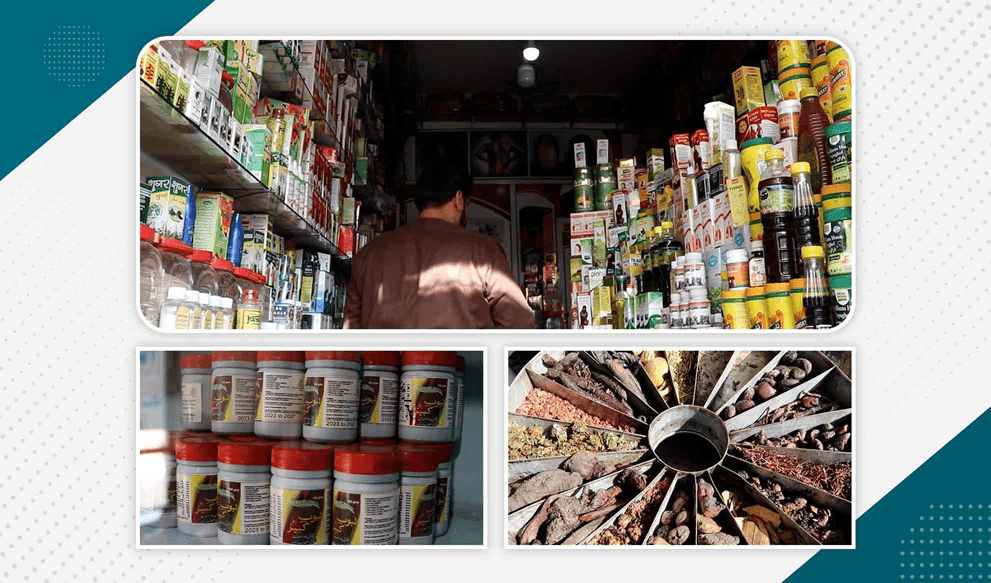KABUL (Pajhwok): Some Unani medicine practitioners claim they can successfully treat various ordinary and complicated diseases.
However, an internal medicine specialist thinks the Greeco-Arab medical system could not be equated with modern-day medicine.
Meanwhile, the Ministry of Public Health (MoPH) announced a plan to frame standardised procedure for the Unani medicine in the interest of public health.
Unani Hakims: Increased public trust lead to growth of Unani medicine
Abdul Wahab Jabarzai, a hakim who has been running a pharmacy near Pamir Cinema in Kabul for the past 14 years, examines five to 10 patients daily.
He told Pajhwok Afghan News Unani treatment often yielded positive results, boosting public confidence in traditional remedies.
“Unani doctors don’t just prescribe medicine; they assess the entire system of the human body while treating patients. Based on Unani medicine principles, we aim to cure illnesses using various natural ingredients,” he said.
Aleem Jan, another hakim in the Chowk area of Kabul, said his business flourishing due to growing ublic trust in Unani medicine.
He attributed his successful business and people’s to the effective results of treatment and affordable prices of Unani remedies.
“Unani medicines are comprised of pure herbs and other natural ingredients, making them cost-effective and free of side effects,” he argued.
Syed Karim Sadat, yet another hakim, explained they largely sold medicines for addressing stomach problems, prostate issues and high cholesterol levels. Additionally, they offer a variety of tonics for muscle strength.
Sadat said the patients who fail to find remedies at modern health centres turned to Unani treatment. However, he clarified that they did not treat severe conditions like heart diseases and referred such patients to hospital.
He went on to point out that Unani medicines were not prescribed for children below a certain age.
Public opinion on Unani medicine
Residents of Kabul hold mixed views about Unani medicine. While some believe in its efficacy, others have their reservations.
Faiz Mohammad, a 60-year-old resident of the capital who visited a Unani pharmacy, expressed a strong preference for Unani medicine over orthodox treatment.
“When I go to hospital, they charge me a thousand or more afghanis. But at a Unani pharmacy, the medicine costs only 500 afghanis. That’s why I prefer coming here,” he said.
But another Kabul inhabitant,Waisuddin, alleged the medication prescribed by hakims had no effect.
He recalled: “My wife recently fell ill. One hakim gave her medicine worth 8,000 afs and another charged her 5,000 afs. Later, I took her to Pakistan and spent 60,000 afs on her treatment there. None of the hakims talks to you clearly; they are all fraudsters.”
Waisuddin advised people to consult qualified doctors and pursue treatment at hospitals instead of visiting hakims.
Specialist says no comparision
Sajjasd Waziri, a specialist of infectious internal diseases, believed Unani medicine could not be compare with modern drugs.
Unani medicine could be used to treat common illnesses but it had little efficacy in dealing with complicated ailments like cancer, cardiac issues and high blood pressure levels, the Kabul-based specialist maintained.
Sajjad commented: “The Unani medicine is an old healing method that treats some ordinary diseases but scientific research shows the only effective remedy for treating complicated ailment is modern-day medicine.”
Illnesses such as heart failure and nervous attacks killed people soon, he noted, insisting contemporary medicine effectively addressed such problems. However, he explained, the Unani medicine was not that efficacious.
He claimed the traditional healing system was still not included in modern medicines which were already part of Unani medications and hence the efficacy of allopathic drugs.
Policy on Unani medicine
Dr Sharafat Zaman Amar, spokesman for the Ministry of Public Health (MoPH), told Pajhwok Afghan News they were working on a standardised and comprehensive procedure for Unani medicine in the interest of public health.
Amar said: “Work is being done to evolve a procedure for Unani medicine in Afghanistan and MoPH will share it in coming days with the media.”
According to figures from Unani Hakims Association, 110 such practitioners are involved officially and 1,000 unofficially in this type of healing across the country.
kk/aw/mud







GET IN TOUCH
NEWSLETTER
SUGGEST A STORY
PAJHWOK MOBILE APP